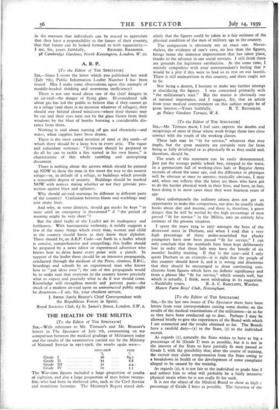A. R. P.
[To the Editor of THE SPECTATOR] SIR,—Since I wrote the letter which you published last week (July 7th), Public Information Leaflet Number I has been issued. May I make some observations upon this example of muddle-headed thinking and monstrous inefficiency?
There is not one word about one of the chief dangers in an air-raid—the danger of flying glass. Ill-considered talk about gas has led the public to believe that if they cannot go to a refuge (and there is no mention whatever of refuges), they should stay behind closed windows—where their throats may be cut and their eyes torn out by the glass blown from their windows by the blast of bombs bursting a considerable dis- tance from them.
Nothing is said about turning off gas and electricity—and water, when supplies have been drawn.
There is the most casual mention of sand or dry earth—of which there should be a large box in every attic. The vague and redundant sentence : " Everyone should be prepared to do all he can to tackle a fire started in his own house," is characteristic of this whole rambling and uninspiring document.
There is nothing about the arrows which should be painted up NOW to show the man in the street the way to the nearest refuge—or, in default of a refuge, to buildings which provide a reasonable degree of security. Buildings should be marked NOW with notices stating whether or not they prbvide pro- tection against blast and splinters.
Why should air-raid warnings be different in different parts of the country? Confusion between blasts and warblings may cost many lives.
And why, in some districts, should gas masks be kept " in store until an emergency is threatened " if " the period of warning might be very short "?
But the chief faults of the Leaflet are its inadequacy and feebleness. With bureaucratic verbosity, it mildly suggests a few of the many things which every man, woman and child in the country should know as they know their alphabet. There should be an A.R.P. Code—set forth in a leaflet which is concise, comprehensive and compelling; this leaflet should be prepared by a news editor or experienced advertiser who knows how to drive home every point with a punch. In support of the leaflet there should be an intensive propaganda, conducted through the medium of the Press, cinemas, B.B.C., hoardings and schools by an experienced man who knows how to " put ideas over "; the aim of this propaganda would be to make sure that everyone in the country knows precisely what to expect and precisely what to do if war should come. Knowledge will strengthen morale and prevent panic—the shock of a modern air-mid upon an uninstructed public might be disastrous.—I am, Sir, your obedient servant, J. SWIRE (lately Reuter's Chief Correspondent with the Republican Forces in Spain).
Royal Societies Club, 63 St. 7ames's Street, London, S.W. r.










































 Previous page
Previous page